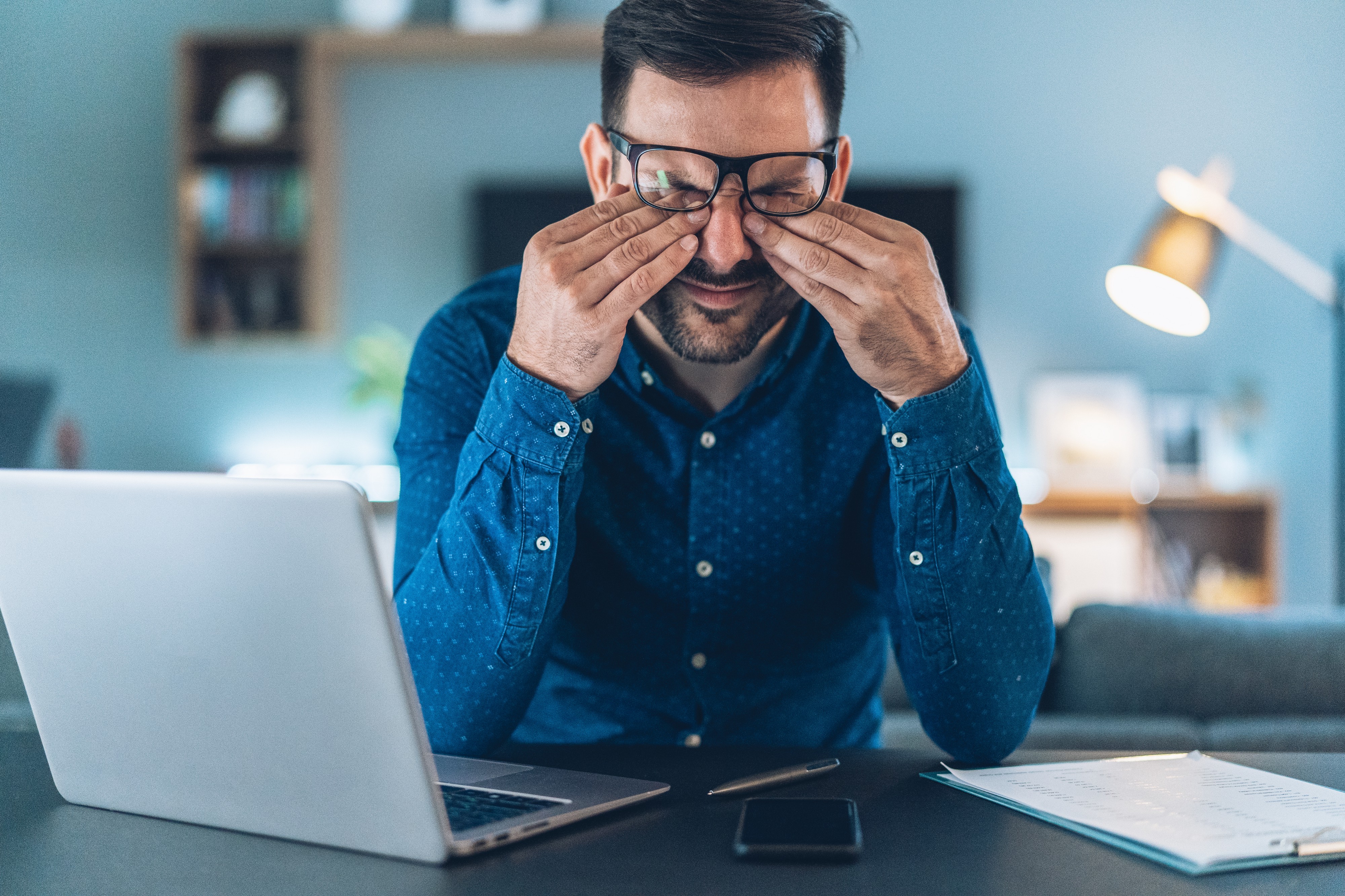A comprehensive guide to one of the body?s most irritating quirks (and how to make it stop)
 Credit: filadendron/Getty Images
Credit: filadendron/Getty Images
 Jake Cooper was working for a Fortune 50 company in the Midwest when he found out his management job was on the line. Right before Christmas, in the midst of significant layoffs in his office, his right eye started twitching on and off. He chalks it up to extreme stress and fatigue.
Jake Cooper was working for a Fortune 50 company in the Midwest when he found out his management job was on the line. Right before Christmas, in the midst of significant layoffs in his office, his right eye started twitching on and off. He chalks it up to extreme stress and fatigue.
?I dreaded going to work, and I wasn?t sleeping well,? Cooper says. ?I finally went to my family doctor, and that was the first time I started putting a name to what I was experiencing: generalized anxiety disorder.? With a combination of anti-anxiety medication, psychotherapy, and time?he says it took around six months to dissipate ? Cooper?s eye twitching finally stopped, and it hasn?t come back.
Twitching around the eye, which is medically referred to as eyelid myokymia, happens when the muscle around the eye ? the orbicularis oculi ? contracts involuntarily. Dr. Stephanie Erwin, an optometrist at the Cleveland Clinic Cole Eye Institute, says most myokymia cases involve twitching of the lower eyelid, but some people experience these muscle spasms on their upper eyelids, too. Usually, people experience intermittent twitching of just one eye.
According to Dr. Brian Zaugg, an ophthalmologist at the John A. Moran Eye Center at the University of Utah, these spasms occur when calcium spreads through the eye muscles. ?It?s essentially a mismanagement of calcium regulation in that localized environment ? calcium spills out into the muscle, which causes it to twitch,? he says. ?That?s the normal way all muscles contract, with a release of calcium and a chemical reaction that allows our muscles to move.?
In any case, twitching is generally not something to worry about. Doctors agree that most of the time, eye twitching is benign ? meaning there?s not usually a grave, underlying medical cause. ?In the vast majority of cases, eye twitching isn?t associated with any disease process,? Erwin says. ?It?s a fairly common issue. Even I have it once in a while.?
Dr. Jennifer Stone, an optometrist with Levin Eyecare in Maryland, says eyelid spasms don?t usually indicate or cause vision problems, either. Still, she says it can be off-putting when something is happening to your eye, even if it?s not life-threatening. ?Patients will often come in and say they?ve had an eye twitch for a few days and they get really upset and alarmed. Vision is one sense that people get concerned about. People associate it with mortality,? she says.
While it?s unlikely to have long-term effects on eyesight, Erwin says in the short term, myokymia can obscure vision, which can be concerning to patients, but again, usually not a cause for alarm. ?If the eyelid is twitching so much that it?s covering the pupil, it can cause a shaking sensation for the vision, but it doesn?t have any long-term effects on the vision or the health of the eye,? she says.
?You may never have it again, but it might come up in a stressful period. It?s annoying, really.?
As annoying as eye twitching can be for people, Zaugg says doctors aren?t totally sure about what causes it, and that it can appear even when people live normal, healthy lifestyles. But there are lifestyle factors that may affect eyelid spasms. Experts theorize that stress and fatigue, as Cooper experienced, can be a trigger for some people, though they aren?t sure why. Zaugg says theoretically, stress or lack of sleep could lead to eye strain and irritation, which could cause the muscles to spasm.
Stone also says too much or too little caffeine and even alcohol intake can also contribute to eye twitching. Patients taking prescription medication for Parkinson?s Disease or psychosis may also notice eye twitching as a side effect. ?It can be really difficult to narrow down a trigger without keeping a diary,? she says.
Anything that causes eye irritation or strain, whether an incorrect eyeglass prescription or dryness in the eyes, which irritates the cornea, can also contribute to muscle spasms in the eyelid. Zaugg says he typically recommends patients have their vision tested and double-check their eye prescription to make sure glasses aren?t causing eye strain. In the case of dry eye, he suggests over-the-counter artificial tears to increase moisture. ?The way you avoid dry eye is by blinking and spreading tears, so eye twitching can just be the eye saying it needs to blink,? he says.
How to make it stop
Stone says in addition to being benign, most eye twitching is also self-limiting ? it tends to go away on its own. Unfortunately, that also means there?s not a quick fix, which can frustrate people. ?It?s disheartening to have to tell patients that a doctor can?t fix it. Sometimes I?ll recommend a compress to soothe muscles to get them to stop twitching, but it?s really episodic, and it stops when it stops,? Stone says. ?You may never have it again, but it might come up in a stressful period. It?s annoying, really.?
Dr. Monica Khalil, an ophthalmologist with Summit Medical Group in New Jersey, says the best bet to manage eye twitching (and prevent future episodes) is to keep track of lifestyle triggers like stress, too much caffeine, or lack of sleep, then try to minimize exposure to those triggers. For example, if you notice your eye is twitching more when you?ve been staying up late to work or drinking more than your usual one cup of coffee in the morning, try getting a little more sleep and reducing your caffeine intake. With a bit of time, these simple changes can make a big difference.
?I, for the most part, tell people watch and wait,? Khalil says. ?I also tell them they should limit their intake of caffeine, get more rest, limit the intake of alcohol, and try stress-relieving exercises. Even doing one of those things can help.?
In rare and extreme, long-term myokymia cases ? like if someone has an eye twitch for months on end and significant lifestyle changes aren?t helping ? Zaugg says he sometimes suggests patients try Botox around the affected eye. ?A small amount of Botox can paralyze and relax the muscle so it doesn?t have the ability to spasm. That usually cures it, and if not, it will usually last for three or four months,? he says.
Dr. Susan Besser, a primary care physician with Mercy Personal Physicians, says rubbing the eyes excessively can make the problem worse, but she recommends gently but firmly pressing on the eyelid to calm the muscles and redirect the nerves. ?It?s kind of like holding your breath when you have the hiccups ? you?re redirecting the neuro-sensory input,? she says.
If the eyelid twitching doesn?t stop, if it begins to impact vision more profoundly, or if muscle spasms spread to other parts of the face, like the cheeks, jaw, or another eye, it?s important to discuss it with a primary care provider who can rule out underlying neurological causes, like a hemifacial spasm or complications from conditions like multiple sclerosis or Parkinson?s Disease. You can also see an optometrist or ophthalmologist, who specializes in eye health.
?If patients are having any symptoms relating to the eye, an evaluation from an eye care professional is a great place to start to make sure the eyes are healthy,? Erwin says. ?If it?s persisting, getting the primary care doctor involved would be the next step.?
But Zaugg encourages patients not to worry if the twitching is local to the eyelid ? concerning complications are rare. ?I probably see three or four patients a year that I?m concerned something more serious is going on, whereas an eyelid twitch is something that I see once a week,? he says. ?I call it a benign annoyance.?


